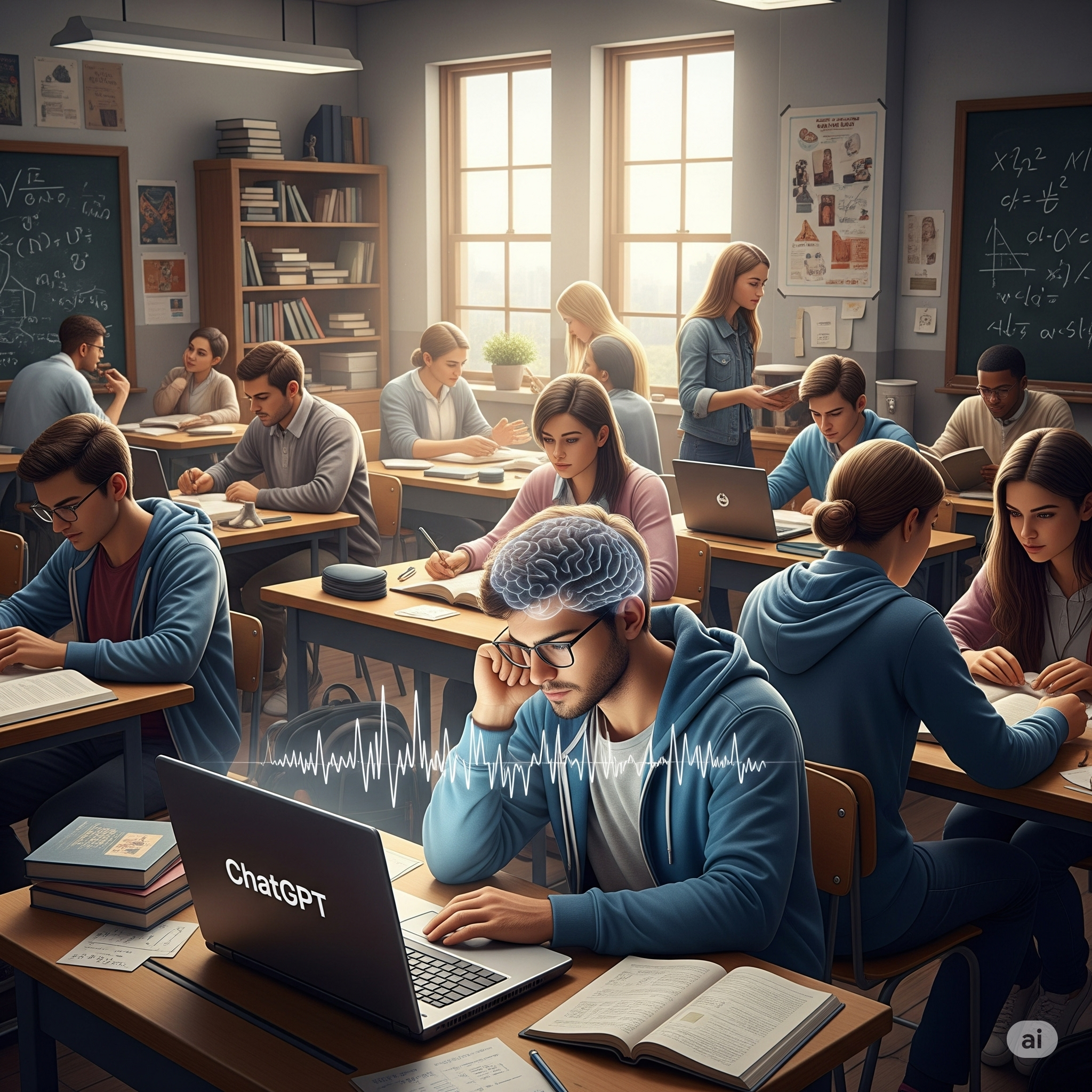📦 Quick Summary:
- MIT researchers found reduced brain activity in students using ChatGPT for writing tasks.
- EEG scans revealed lower neural and linguistic engagement in AI-dependent users.
- Over time, reliance on AI writing tools hindered learning and critical thinking.
- The study suggests that passive content consumption driven by AI could affect cognitive development.
- Experts urge balanced AI usage, especially in education and creative writing tasks.
📚 New Study Sends a Strong Message
As artificial intelligence tools like ChatGPT become more popular among students, researchers at the Massachusetts Institute of Technology (MIT) have raised an important red flag. In a first-of-its-kind study involving EEG brain scans of 54 university students, the researchers found that heavy reliance on AI for essay writing reduced neural engagement, resulting in lower learning outcomes and critical thinking over time.
This blog breaks down the study’s findings, what it means for education, and how we can use AI wisely—without letting it think for us.
🧪 The Experiment: What Was Tested?
MIT’s research team wanted to understand how students engage cognitively when writing essays—with and without AI assistance.
🧠 Methodology:
- Participants: 54 university students
- Tools: EEG (electroencephalogram) headsets to monitor brain activity
- Process: Students were divided into two groups:
- One group used ChatGPT to help generate essays
- The other group wrote essays unaided
- Duration: Multiple essay tasks over several weeks
The team monitored neural signals related to language processing, attention, and memory.
📉 The Results: Less Brain, More Bot
The study revealed a clear cognitive decline in students who relied heavily on ChatGPT:
- Lower engagement in the prefrontal cortex, which handles reasoning and decision-making.
- Reduced language-processing activity, meaning students weren’t thinking deeply about their own words.
- Weaker memory encoding, suggesting they retained less of what they read or wrote.
The researchers noted that these effects intensified over time, indicating a decline in cognitive stamina when AI was regularly used as a shortcut.
⚠️ Why This Matters: AI May Promote Mental Passivity
The findings echo growing concerns in the education and neuroscience communities. While AI tools like ChatGPT can enhance productivity, their overuse can:
- Discourage independent thinking
- Lower writing skills and vocabulary development
- Foster algorithmic dependence where users accept outputs without questioning accuracy or logic
- Reduce engagement with complex topics
Essentially, when AI does all the work, the brain stops training itself.
🧭 Educational Implications: A Digital Dilemma
Many schools and colleges have embraced AI tools, integrating them into classrooms. But this study suggests educators must draw boundaries:
✅ Where AI Can Help:
- Brainstorming or outlining ideas
- Improving grammar or structure
- Translating concepts in simpler language
❌ Where AI May Harm:
- Writing full essays or assignments
- Replacing critical reading and argument-building
- Encouraging copy-paste culture
Educators are now urged to promote AI literacy—helping students understand how to use AI without compromising learning.
💬 What the Researchers Say
One of the lead authors commented:
“AI tools are not inherently bad, but our brains adapt to convenience. The more we offload cognitive effort, the less we build critical neural pathways essential for learning.”
This reinforces a key truth: technology should amplify human thinking—not replace it.
🔮 The Future of Learning: Augmentation, Not Automation
The goal should not be to eliminate AI from education, but to reimagine how it is used:
- Hybrid models where AI assists but doesn’t replace student input
- Assignments that require reflection, personalized perspectives, or original arguments
- Policies that ensure ethical, responsible use of AI tools like ChatGPT
When used properly, AI can help students learn smarter, not just faster.
🔚 Conclusion: Think Before You Prompt
MIT’s study is a timely reminder that while AI offers incredible tools, over-reliance can cost us our cognitive edge. Writing is not just about producing words—it’s about forming thoughts, developing reasoning, and learning how to express ourselves.
Students, educators, and professionals must aim for a balance between efficiency and engagement, using AI to augment human intelligence—not suppress it.









+ There are no comments
Add yours